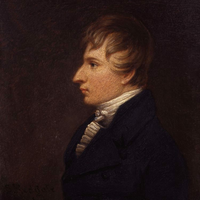Fragments
Saw’st thou that light? exclaim’d the youth, and paused:
Through yon dark firs it glanced, and on the stream
That skirts the woods it for a moment play’d.
Again, more light it gleam’d,-or does some sprite
Delude mine eyes with shapes of wood and streams,
And lamp far beaming through the thicket’s gloom,
As from some bosom’d cabin, where the voice
Of revelry, or thrifty watchfulness,
Keeps in the lights at this unwonted hour?
No sprite deludes mine eyes,-the beam now glows
With steady lustre.-Can it be the moon
Who, hidden long by the invidious veil
That blots the Heavens, now sets behind the woods?
No moon to-night has look’d upon the sea
Of clouds beneath her, answer’d Rudiger,
She has been sleeping with Endymion.
The pious man,
In this bad world, when mists and couchant storms
Hide Heaven’s fine circlet, springs aloft in faith
Above the clouds that threat him, to the fields
Of ether, where the day is never veil’d
With intervening vapours, and looks down
Serene upon the troublous sea, that hides
The earth’s fair breast, that sea whose nether face
To grovelling mortals frowns and darkens all;
But on whose billowy back, from man conceal’d,
The glaring sunbeam plays.
Lo! on the eastern summit, clad in gray,
Morn, like a horseman girt for travel, comes,
And from his tower of mist,
Night’s watchman hurries down.
There was a little bird upon that pile;
It perch’d upon a ruin’d pinnacle,
And made sweet melody.
The song was soft, yet cheerful, and most clear,
For other note none swell’d the air but his.
It seem’d as if the little chorister,
Sole tenant of the melancholy pile,
Were a lone hermit, outcast from his kind,
Yet withal cheerful. I have heard the note
Echoing so lonely o’er the aisle forlorn,
O pale art thou, my lamp, and faint
Thy melancholy ray:
When the still night’s unclouded saint
Is walking on her way.
Through my lattice leaf embower’d,
Fair she sheds her shadowy beam,
And o’er my silent sacred room
Casts a checker’d twilight gloom;
I throw aside the learned sheet,
I cannot choose but gaze, she looks so mildly sweet.
Sad vestal, why art thou so fair,
Or why am I so frail?
Methinks thou lookest kindly on me, Moon,
And cheerest my lone hours with sweet regards!
Surely like me thou’rt sad, but dost not speak
Thy sadness to the cold unheeding crowd;
So mournfully composed, o’er yonder cloud
Thou shinest, like a cresset, beaming far
From the rude watch-tower, o’er the Atlantic wave.
O give me music-for my soul doth faint;
I’m sick of noise and care, and now mine ear
Longs for some air of peace, some dying plaint,
That may the spirit from its cell unsphere.
Hark how it falls! and now it steals along,
Like distant bells upon the lake at eve,
When all is still; and now it grows more strong,
As when the choral train their dirges weave,
Mellow and many-voiced; where every close,
O’er the old minster roof, in echoing waves reflows.
Oh! I am wrapt aloft. My spirit soars
Beyond the skies, and leaves the stars behind.
Lo! angels lead me to the happy shores,
And floating p?ans fill the buoyant wind.
Farewell! base earth, farewell! my soul is freed,
Far from its clayey cell it springs,-
And must thou go, and must we part?
Yes, Fate decrees, and I submit;
The pang that rends in twain my heart,
Oh, Fanny, dost thou share in it?
Thy sex is fickle,-when away,
Some happier youth may win thy—
Ah! who can say, however fair his view,
Through what sad scenes his path may lie?
Ah! who can give to others’ woes his sigh,
Secure his own will never need it too?
Let thoughtless youth its seeming joys pursue,
Soon will they learn to scan with thoughtful eye
The illusive past and dark futurity;
Soon will they know–
Hush’d is the lyre-the hand that swept
The low and pensive wires,
Robb’d of its cunning, from the task retires.
Yes-it is still-the lyre is still;
The spirit which its slumbers broke
Hath pass’d away,-and that weak hand that woke
Its forest melodies hath lost its skill.
Yet I would press you to my lips once more,
Ye wild, yet withering flowers of poesy;
Yet would I drink the fragrance which ye pour,
Mix’d with decaying odours: for to me
Ye have beguiled the hours of infancy,
As in the wood—paths of my native—
When high romance o’er every wood and stream
Dark lustre shed, my infant mind to fire,
Spell-struck, and fill’d with many a wondering dream,
First in the groves I woke the pensive lyre.
All there was mystery then, the gust that woke
The midnight echo was a spirit’s dirge,
And unseen fairies would the moon invoke
To their light morrice by the restless surge.
Now to my sober’d thought with life’s false smiles,
Too much…
The vagrant Fancy spreads no more her wiles,
And dark forebodings now my bosom fill.
Once more, and yet once more,
I give unto my harp a dark woven lay;
I heard the waters roar,
I heard the flood of ages pass away.
O thou, stern spirit, who dost dwell
In thine eternal cell,
Noting, gray chronicler! the silent years,
I saw thee rise,-I saw the scroll complete;
Thou spakest, and at thy feet
The universe gave way.

